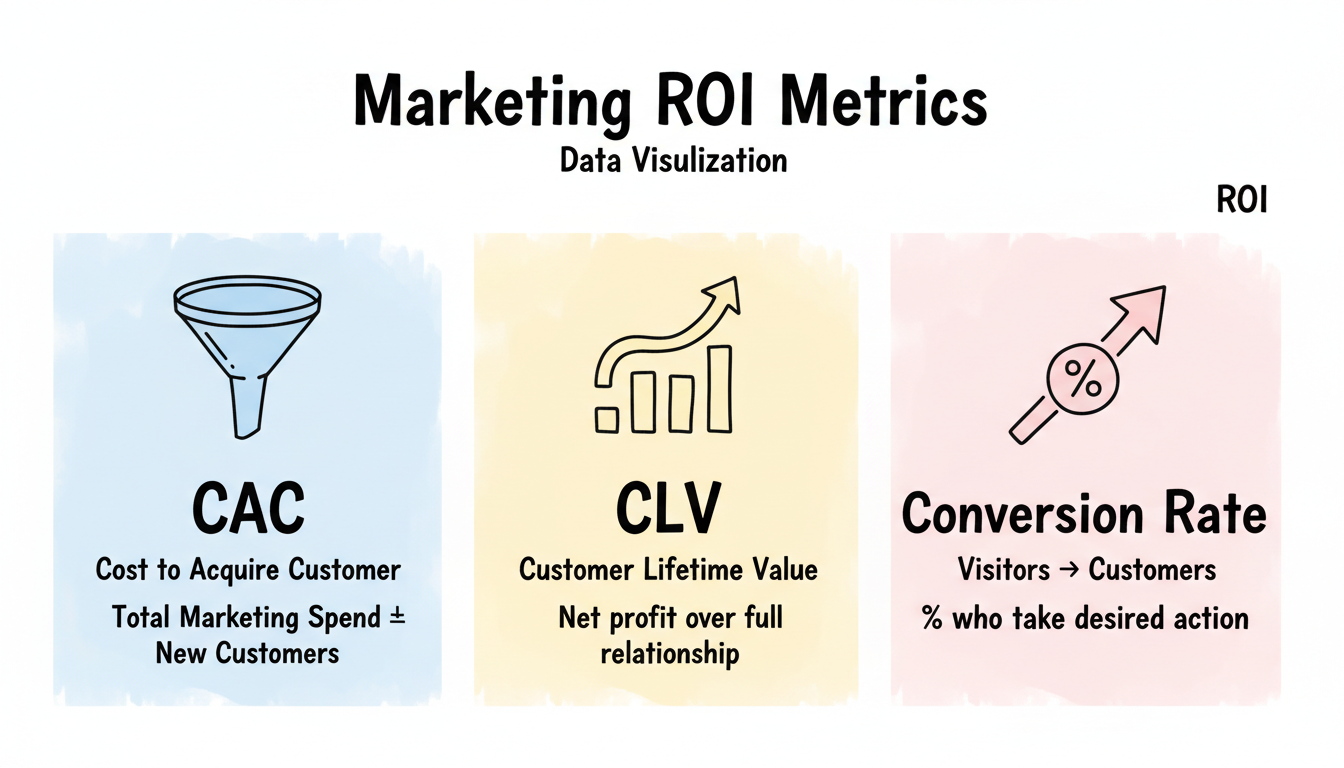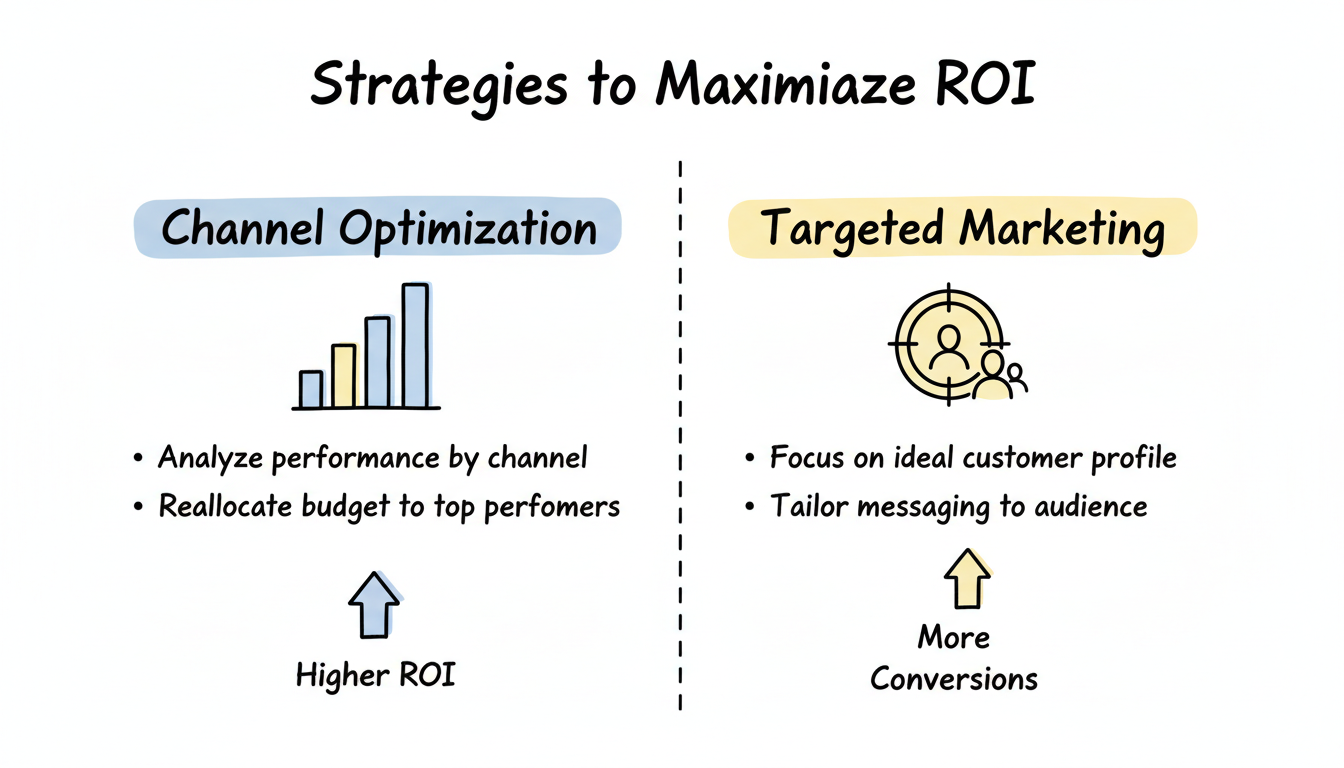In today's competitive business landscape, measuring the return on investment (ROI) of marketing efforts is crucial for the success of startups. By understanding the metrics and analytics that drive marketing ROI, startups can make informed decisions to optimize their marketing strategies and fuel growth.
ROI, in the context of marketing, refers to the measurable value generated from marketing investments. It is a key performance indicator that helps startups gauge the effectiveness and efficiency of their marketing campaigns. Understanding ROI is essential for startups as it provides insights into the impact of their marketing efforts and guides decision-making processes.
When it comes to startups, every dollar counts. They often have limited resources and need to make strategic decisions to ensure the success and growth of their business. This is where ROI comes into play. By measuring the return on investment, startups can determine the effectiveness of their marketing activities and make informed decisions about where to allocate their resources.
But what exactly is ROI in the context of marketing? Simply put, it is the ratio of the net profit generated from marketing activities to the cost incurred. It shows the financial return generated from each marketing dollar invested. By calculating ROI, startups can assess the value of their marketing efforts and make data-driven decisions to optimize their strategies.
ROI in marketing goes beyond just looking at the revenue generated. It takes into account the costs associated with marketing activities, such as advertising expenses, campaign development, and marketing personnel. By considering both the costs and the revenue, startups can get a clear picture of the overall impact of their marketing efforts.
For example, let's say a startup invests $10,000 in a marketing campaign and generates $20,000 in revenue. At first glance, it may seem like a successful campaign with a 100% ROI. However, when you factor in the costs associated with the campaign, such as $5,000 for advertising and $2,000 for campaign development, the net profit becomes $13,000. This results in an ROI of 30%, which provides a more accurate representation of the campaign's effectiveness.
ROI plays a pivotal role in guiding startups' marketing strategies. It allows startups to identify which marketing channels, campaigns, or tactics are delivering the highest returns. By focusing on high ROI activities, startups can allocate their resources effectively and maximize their marketing efforts.
For instance, let's say a startup is running multiple marketing campaigns across various channels, including social media, email marketing, and content marketing. By analyzing the ROI of each channel, the startup can determine which one is driving the most revenue and adjust its marketing strategy accordingly. If social media is generating a higher ROI compared to email marketing, the startup may decide to allocate more resources to social media campaigns and optimize their email marketing strategy to improve its ROI.
Furthermore, ROI can help startups identify areas of improvement in their marketing campaigns. By tracking the ROI of different campaigns, startups can identify underperforming campaigns and make necessary adjustments to improve their effectiveness. This could involve tweaking the messaging, targeting a different audience, or exploring new marketing channels.
In conclusion, ROI is a crucial metric for startups to measure the success of their marketing efforts. By understanding the importance of ROI and incorporating it into their decision-making processes, startups can make informed choices that will drive their business forward and maximize their marketing ROI.

Several key metrics help evaluate marketing ROI for startups. Understanding these metrics is crucial for startups to make strategic decisions and optimize their marketing initiatives.
When it comes to evaluating marketing ROI, startups need to consider various factors that contribute to their success. Let's delve deeper into some of the key metrics that play a significant role in assessing marketing effectiveness.
CAC is the average cost incurred to acquire a new customer. It includes expenses on marketing campaigns, sales activities, and any other costs related to customer acquisition. By calculating CAC, startups can evaluate the efficiency of their customer acquisition strategies and adjust accordingly.
Startups often face the challenge of acquiring customers in a cost-effective manner. By closely monitoring their CAC, they can identify areas where they may be overspending or underutilizing resources. This metric allows startups to make data-driven decisions and allocate their marketing budget more effectively.
CLV represents the net profit generated from a customer throughout their entire relationship with a startup. By comparing CLV with CAC, startups can assess the long-term value of acquiring a customer and determine whether their marketing efforts are sustainable.
Understanding the CLV is essential for startups as it helps them prioritize their marketing strategies. By focusing on acquiring customers with higher CLV, startups can ensure a more profitable customer base. Additionally, by analyzing the CLV of different customer segments, startups can tailor their marketing efforts to target the most valuable customers.
Conversion rates measure the percentage of website visitors or leads that take a desired action, such as making a purchase or filling out a form. By analyzing conversion rates, startups can identify opportunities to optimize their marketing funnels and improve ROI.
Startups invest a significant amount of time and resources in driving traffic to their websites. However, if visitors are not converting into customers, it can hinder the overall marketing ROI. By closely monitoring conversion rates, startups can identify any bottlenecks in their marketing funnel and implement strategies to improve the conversion process.
Furthermore, startups can leverage conversion rate optimization techniques to maximize the effectiveness of their marketing campaigns. By conducting A/B testing, optimizing landing pages, and improving call-to-action elements, startups can increase their conversion rates and ultimately enhance their marketing ROI.
In conclusion, evaluating marketing ROI is crucial for startups to measure the success of their marketing efforts. By considering metrics such as CAC, CLV, and conversion rates, startups can make informed decisions, optimize their marketing strategies, and drive sustainable growth.
Analytics tools are essential for measuring marketing ROI. They provide startups with valuable insights into the performance of their marketing campaigns and help them make data-driven decisions to improve ROI.
Measuring return on investment (ROI) is crucial for startups to evaluate the success of their marketing efforts. By analyzing data and metrics, startups can determine the effectiveness of their strategies and make informed decisions to optimize their campaigns.
Google Analytics is a powerful tool that startups can use to track and analyze their website traffic. By setting up goals and conversion tracking, startups can measure the effectiveness of their marketing efforts and identify areas for improvement.
With Google Analytics, startups can gain valuable insights into their website visitors, such as their demographics, interests, and behavior. By understanding their target audience better, startups can tailor their marketing strategies to effectively reach and engage potential customers.
In addition to tracking website traffic, Google Analytics also provides startups with data on the sources of their traffic. Startups can analyze which channels are driving the most traffic and conversions, allowing them to allocate their marketing budget and resources more effectively.
Social media platforms provide startups with a wealth of data that can be used to measure marketing ROI. Analyzing engagement metrics, such as likes, shares, and comments, helps startups evaluate the effectiveness of their social media campaigns and optimize their strategies accordingly.
By monitoring social media analytics, startups can identify which posts and content resonate the most with their audience. This information can be used to create more targeted and engaging content, resulting in higher conversion rates and ROI.
Social media analytics also allow startups to track the growth of their social media following and measure the impact of their social media efforts on brand awareness. By analyzing metrics such as follower growth, reach, and impressions, startups can assess the effectiveness of their social media strategies in reaching and engaging their target audience.
Furthermore, social media analytics provide startups with insights into the demographics and interests of their social media followers. This information can be used to refine their target audience and tailor their marketing messages to better resonate with their ideal customers.
In conclusion, analytics tools, such as Google Analytics and social media analytics, play a crucial role in measuring marketing ROI for startups. By leveraging these tools, startups can gain valuable insights into their marketing performance, make data-driven decisions, and optimize their strategies to achieve higher ROI.
Measuring marketing ROI for startups comes with its fair share of challenges. Overcoming these challenges is essential to effectively evaluate the success of marketing efforts.
When it comes to startups, the journey to success is often filled with uncertainties and obstacles. One of the biggest challenges they face is dealing with limited data. Unlike established companies with years of historical data, startups often struggle to collect sufficient data to accurately measure marketing ROI. Limited resources and short operating histories can make it challenging to gather enough data for meaningful analysis. However, startups can mitigate this challenge by setting clear goals, tracking relevant metrics, and leveraging analytics tools.
Startups are no strangers to budget constraints. Every penny counts, and allocating funds for marketing activities can be a daunting task. This brings us to another challenge in measuring marketing ROI for startups - overcoming budget constraints. Limited financial resources can hinder startups' ability to invest in advanced analytics tools or hire specialized personnel to handle data analysis. However, the good news is that cost-effective alternatives and free analytics tools are available in the market. By exploring these options, startups can overcome budget limitations and still measure marketing ROI effectively.
Furthermore, startups often operate in highly competitive markets, where every marketing dollar needs to be spent wisely. This adds another layer of complexity to measuring marketing ROI. Startups need to ensure that their marketing efforts are not only generating leads but also converting them into paying customers. This requires a deep understanding of customer behavior, market trends, and the effectiveness of various marketing channels. By continuously monitoring and analyzing these factors, startups can gain valuable insights into their marketing ROI and make data-driven decisions to optimize their strategies.
In addition to limited data and budget constraints, startups also face the challenge of accurately attributing sales and revenue to specific marketing activities. Unlike traditional brick-and-mortar businesses, startups often rely heavily on digital marketing channels, making it difficult to track and measure the impact of each individual campaign. However, with the help of advanced tracking tools, startups can implement attribution models that assign credit to various touchpoints along the customer journey, providing a clearer picture of the ROI generated by each marketing effort.
Measuring marketing ROI for startups is undoubtedly a complex task, but it is not impossible. By overcoming challenges such as limited data, budget constraints, and accurate attribution, startups can gain valuable insights into the effectiveness of their marketing strategies. Armed with this knowledge, they can make informed decisions, optimize their marketing efforts, and ultimately drive growth and success in their respective industries.
To improve marketing ROI, startups can deploy various strategies targeted at optimizing their marketing efforts and maximizing returns.
Startups should analyze the performance of different marketing channels and identify the ones that generate the highest ROI. By reallocating resources to focus on high-performing channels, startups can optimize their marketing efforts and achieve better results.
Targeted marketing allows startups to reach their ideal customers and tailor their messaging to resonate with specific audiences. By focusing on a well-defined target market, startups can increase engagement, conversions, and ultimately, ROI.
Ultimately, measuring marketing ROI is essential for startups to evaluate the success of their marketing efforts and make informed decisions for growth. By understanding the metrics and leveraging analytics tools, startups can optimize their marketing strategies and achieve higher returns on their investments.

By submitting this form, you agree to our Privacy Policy and Terms & Conditions.